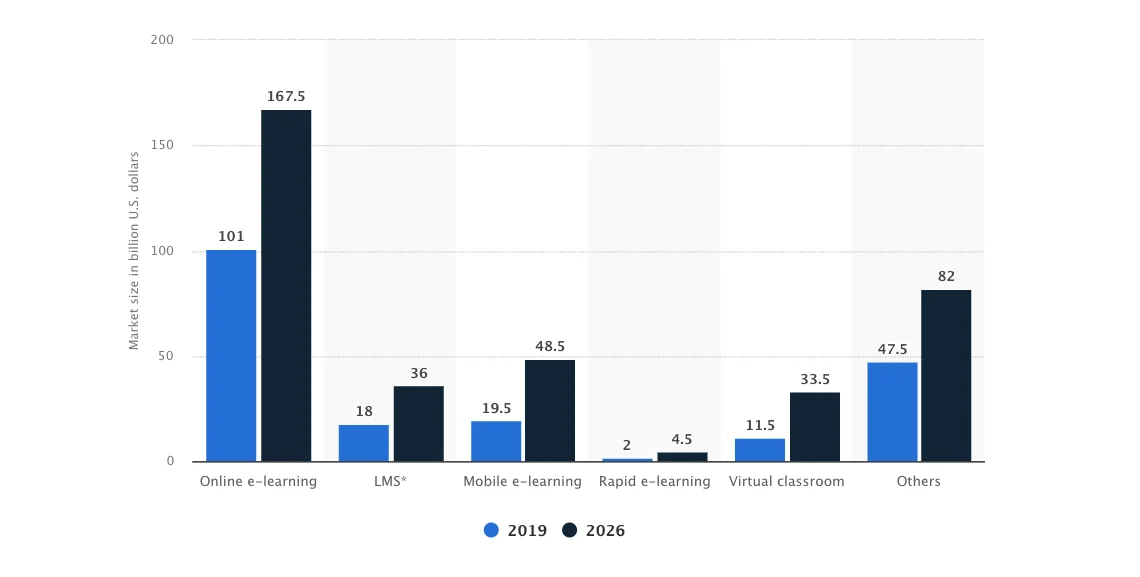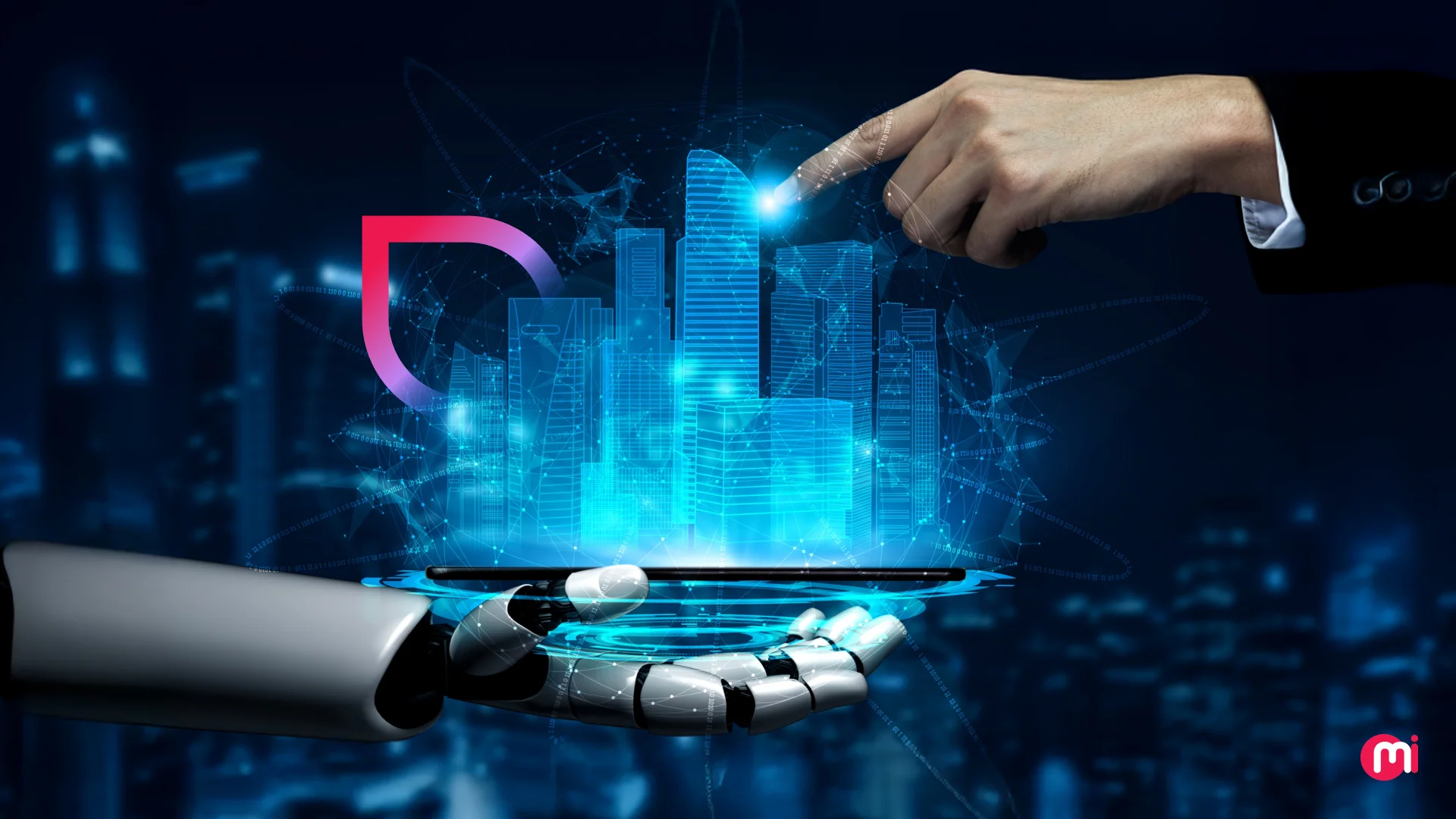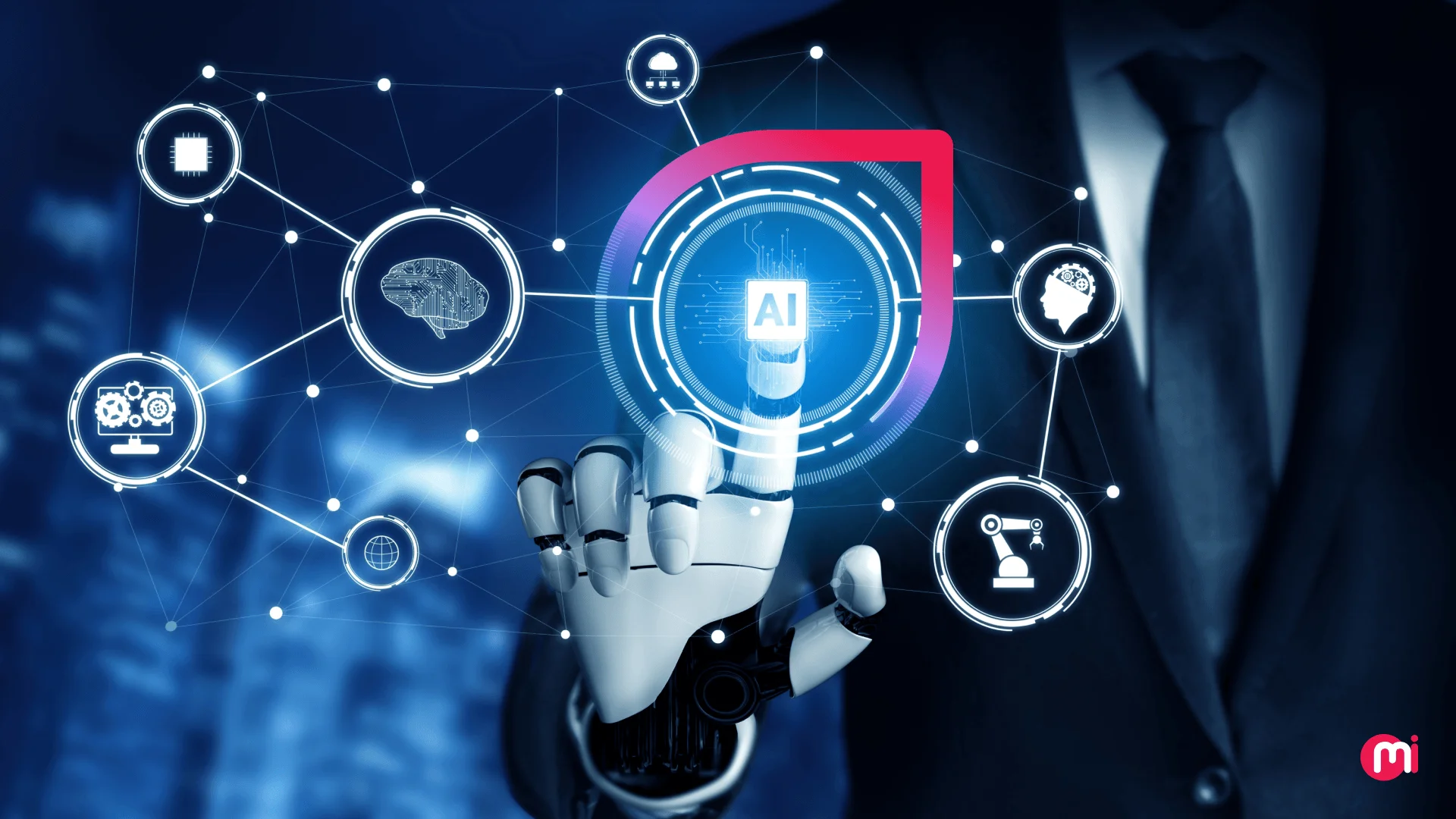AI in Education: How EdTech Startups Can Implement It?
- AI/ML
- October 16, 2023
AI is no longer just a buzzword but a necessity in today’s technology-driven world to thrive in a competitive landscape. Amongst various industries, how can AI revolutionize the education sector? AI in education is transforming learning through compelling use cases, and this blog is your in-depth guide to understanding them.
AI tech is the buzzword regardless of the industry. With the introduction of AI, our perspective of conventional processes and systems has changed leaving us intimidated about the endless possibilities it has to offer. The reason for the increasing implementation of AI is the need for personalization, predictive analytics, and more.
In the education sector, AI has redefined the conventional learning process. Not only it has enabled the education community to unlock the full potential whether it is teaching, learning, or even administrative process for all from K-12 and higher education to even corporate learning.
The pandemic has proved to be a catalyst in not just introducing AI to a wide spectrum of target audiences but also for the technology to leave a lasting impact on its users. Before we learn about the implementation of AI in education, let us first find out the current market size and its future projections.
AI In Education: Market Overview
With the increasing surge in the implementation of Artificial Intelligence, AI in the EdTech market size reached a whopping $2.5 billion in 2022, according to a report by Market Research Future.Even the overall e-learning market size looks promising. According to Statista, by 2026, the global e-learning market is forecast to reach almost 400 billion U.S. dollars.

The above graph depicts the size of the global e-learning market by different segments of the year 2019 and the estimated market size by 2026.
The AI in education market is projected to reach USD 3.68 billion by 2023, offering a bright opportunity for EdTech startups to hire AI developers to implement AI and reap the benefit of a growing market apart from offering your user base an innovative and tailored learning experience.
Now let us find out how EdTech startups can implement AI.
How Can AI Be Implemented in Education?
Whether it is EdTech unicorns/startups or educational institutions, they have adopted AI in various aspects of their software solution. It is reshaping the way all the entities of the education community function, students, teachers, and educational institutions alike.
Here is how you can also be part of this transformation by implementing AI in your educational software solution.
1. Task Automation
Tough AI would not replace the teachers but would surely lighten their load. It would make the burdensome chores of maintaining reports, making presentations and notes, grading tests, record keeping, and more a breeze, helping the educators to reclaim their valuable time. Your AI-powered educational app can even facilitate scheduling, attendance tracking, and managing permission forms. Here is one of the major applications of AI-powered task automation.
Grading software
From checking homework to grading tests, such iterative tasks are highly time-consuming and inevitable. The e-learning software when integrated with vision and language-based modes can enable educators to assess the multiple-choice(bubble sheets), fill-in-the-blank tests, and more to grade the test.
The language-based grading model enables the teachers to score the long-form answers and essays. Automating this time-consuming task enables the teachers to focus more on value-based work.
2. Learning Assistance Outside the Classroom
Parents’ struggle is real when it comes to helping their children with algebra, concepts of quantum mechanics, chemical equations, and more. Apart from students, parents are surely excited with the idea of AI capable of calming down their child’s curiosity.
AI-powered chatbots or virtual learning assistants can help students to keep up with their studies by providing feedback, required information, or instruction to their urgent or unclear questions or concepts 24×7 without any geographical barrier.
Some students feel too shy to ask questions in front of their classmates owing to the fear of feeling embarrassed by the stupidity of the question, anxiety of their mistake, or intimidation of the teacher. The accessibility of AI virtual assistants(which can’t judge the students) enables the student to ask queries freely even at odd hours of the day.
These virtual tutors or assistants adopt a personalized approach to match every individual’s unique learning requirements which brings us to the next AI application in education.
3. Personalized Learning
It’s time to say “adios, amigos” to one-size-fits-all education with personalized learning powered by AI!
The most cliché phrase used for students is that every child is different or their working learning pace. They’ve their unique strengths and weaknesses. For an educator to match each student’s learning pace in an ideal class of 30 students is impossible.
AI from the available student data, analyzes the student’s learning pattern, interests, learning pace, abilities, learning objectives, progress and proficiency, learning history, and more, to provide them with a personalized learning experience. It’s like having a tutor who knows you better than your BFF! Here are some aspects of offering personalized learning to the students.
Intelligent Tutoring Systems(ITS)
ITS are AI-powered learning and assessment tools that can provide students with personalized learning experiences. This AI ML software aims to provide a similar experience to the students that they get from one-to-one tutoring.
Whether it is giving extra algebra problems to solve until you master the subject or not losing patience over your relentless curiosity sprints even at midnight, ITS is like a valuable companion in your journey of educational pursuit which adapts to your learning level and pace.
Translation and communication for multilingual learning
AI can help bridge the language gap(even the cultural gap) and create a global classroom. When learning a language, finding the literal translation using clunky dictionaries can be a tedious job that can be done by AI in a matter of seconds. It would help the students to read the learning materials and even fictional/nonfictional books from other languages.
With the speech recognition prowess of AI, it can easily compare the student’s audio with the ones from the native speakers to enhance the learner’s pronunciation. It can even analyze the student’s reading skills to provide them with personalized feedback.
Access to education for students with special needs
Inclusivity is a matter of debate when it comes to education. Though we say education for everyone, were we able to make it that accessible? We surely can execute the idea fully with the implementation of AI and make digital classrooms a better place for students with hearing or visual impairments.
AI-enabled text-to-speech integrated into your educational software would provide natural language generation powered audio comprehension of learning materials whereas real-time subtitles would make sure that no student misses a word of the lecture or visual presentation. And all of it with a personalized approach to match the learning pace and capability of every specially-abled child.
4. Smart Content Creation
It is about how effectively the students grasp their learning content/material which would have an impact on their overall grades. AI enables educators to craft engaging and personalized content along with enabling them to keep the content accurate.
Here are some applications of AI to consider when you develop an eLearning app for smart content creation.
Information visualization
We all have been part of those least enjoyed history classes, where the teachers bombarded historical facts (dates, places, wars, and whatnot). Now imagine those classes, where students can have a visual tour of those historical places. Not just history, 3D models of the scientific concepts to visualize physics application in real life, would give the students a real-time perspective of the knowledge books are intending to provide.
And the human mind tends to remember the things which we visually experience rather than read. This makes it an added perk for the educator apart from offering the students a learning-educating experience.
Frequent content updates
For the students to stay up-to-date with the right information it is inevitable that their learning material must have the latest information. Even for the parents to know the accurate progress of the child, they must have access to accurate and recent data. Implementing AI can relieve the school management from frazzling over keeping everything to date.
Digital lessons
When it comes to content creation, implementing AI would make the lessons or learning material more personalized, efficient, and accessible to all. You can use generative AI to provide students with flashcards, easy-to-understand guides, textbooks, multiple-choice questions, fill-in-the-blanks, and more to help them understand and master the subjects.
5. AI-Based Intelligent Assistants
For educators to answer repetitive queries individually can be inundating and even time-consuming. Instead providing the students with AI-powered chatbots in EdTech software or e-learning platforms. You can leverage AI technologies like machine learning (ML), natural language processing (NLP), and natural language understanding (NLU) for better interpretation of the students’ queries combined with AI’s generative capabilities.
Not just answering the study-related queries but AI chatbots can offer resolution of various intents. California State University, San Bernardino has deployed a chatbot that helps individuals with admission-related queries, fees, and even campus parking assistance.
By implementing AI in EdTech, here are some of the benefits that not just the students but teachers, parents, and even school management can avail.

Benefits of AI in Education
Imagine a classroom of tomorrow where curiosity thrives and the pursuit of knowledge knows no bounds. It’s where every student has a chance to excel and discover their learning capabilities to their full potential! A classroom where every student gets personalized lessons tailored to their learning pace and style to offer them a more engaging and interactive journey when in pursuit of knowledge. This hypothetical classroom is possible by implementing AI in EdTech.
Let’s explore how various entities of the education community can benefit from the implementation of AI in education.
1. For Students
For learners, AI raises the bar of how they graph the educational content along with eliminating limitations of conventional learning methods. From instant query resolution to personalized learning experience, here is how AI in education will benefit students.
Better learning
AI plays a lucrative role when it comes to fostering a deeper understanding of subjects. Whether it is personalized guidance, customized study places, instant feedback and query resolution, tailored learning material recommendations, and more to empower the students to have complete control over their learning journey.
Improved skills
It is the skills (problem-solving, creativity, critical thinking, adaptive learning, apart from academic proficiency) that help the students to thrive in their careers. It is only possible when the students have control over the thriller journey of gaining the required knowledge. With AI’s personalized approach, students can effectively work on their weaknesses to upskill and enhance personal growth.
2. For Teachers
For educators, AI can be a trusted ally, which provides them with all the necessary real-time insights to act upon for enhancing engagement, relieving the educator from some repetitive time-consuming tasks. Here is how AI in education would benefit the teachers.
Better engagement
Just as one-size-fits-all education is less fruitful, neither is one-size-fits-all teaching. Students can grasp the knowledge better when they are intrigued and motivated. Teachers can leverage AI’s analytical insights on students’ preferences, learning goals, areas of interest, and more to deliver a lecture that sparks their curiosity apart from inducing engagement.
Increased efficiency
From lesson planning to grading, attendance, and more, automating these routine administrative tasks relieves teachers from mundane and time-consuming tasks. The educators can now focus on strategic decision-making and guiding or inspiring students.
3. For Parents
When it comes to being there for their child, especially during their educational growth, parents often feel a lack of a medium that connects them with their child’s educational progress. Here is how AI in education would not only be for their child’s learning experience but for parents too.
Easy monitoring
It was only the PTMs (parent-teacher meetings) where they came to know about their child’s progress (that too if they attend). AI would give them a window through which they can monitor their child’s real-time progress, strengths, weaknesses, performance, and more, allowing them to actively participate in their child’s learning process.
4. For School Management
It isn’t just about enhancing the classroom experience, AI can benefit school management too. Let us find out how AI benefits the behind-the-scenes operation of an educational institution, making things streamlined and effective for both educators and students.
Easier decision making
Resource allocation, class scheduling, student support strategies, budget utilization, and more are some of the complex decisions that the school management makes. These decisions can be more fruitful when backed by reliable data that will not only enhance education outcomes but also optimize operational efficiency.
Reduced staff turnover
It’s the educator’s burden to fulfill the administrative tasks that keep them from shining in their role as a mentor or facilitator of knowledge, this does have a negative impact on staff turnover. With AI-facilitated automation, teachers can focus more on student engagement and teaching.
Optimized resource allocation
Amongst others, funds, time, human resources, curriculum, bus schedules, and even classroom scheduling, need to be taken care of by the school management. As the leaks or underutilization can lead to expensive mistakes for the school management. However, with AI’s predictive analysis and recommendation prowess, school management can improve in the areas that require optimization.
AI in Education: Real-life Edtech Use Cases
AI is transforming traditional education into a dynamic, data-driven, and effective learning experience. Let us know about the real-life application of Artificial Intelligence (AI) in education through the lens of some popular EdTech platforms.
Duolingo
Whether it is their new AI model “BirdBrain”, spaced repetition system, bandit algorithm, or logistic regression algorithm, they have the knack for using AI innovation in their learning platform to offer the best learning experience to their users. Read our blog on how to develop an EdTech app like Duolingo to build one.
Coursera
This eLearning platform features a Coursera coach driven by generative AI, allowing for the automatic generation of course structures, reading materials, assignments, recommendations for relevant public content, and more. Explore our blog to learn more about how to build an eLearning platform like Coursera.
Quizlet
It offers a range of generative AI-powered tools like Q Chat (the first fully adaptive AI tutor), Brain Beats, Memory Score, Quick Summary, and others. These tools empower students to boost their learning abilities and enjoy a creative and innovative learning journey.
Now, let’s move on to the next section of our blog to learn about the advantages of incorporating AI in education.
Future of AI in Education
The education industry is being reshaped by the transformative potential of artificial intelligence. Just as chatbots have become a new normal regardless of the industry, with the increasing preference for personalization even in EdTech among others is where AI will play a key role.
Not only students but even educators would benefit from it with the automation of iterative tasks, and offering groundbreaking real-time insights into increasing the student’s engagement.
Further, the integration of AI with AR/VR would level up the learning experience by providing the students with a perspective beyond the conventional classes. Moreover, AI is set to make education more accessible and engaging whether it is 24/7 support availability, assistive technologies, or bridging the language barrier with AI-powered translations.
In terms of business, the future projections of market size for AI in education look promising making it a good investment opportunity for entrepreneurs and EdTech startups.
Unlock the Power of AI in EdTech with MindInventory!
One of the common traits of the top EdTech Unicorns is they are leveraging AI to offer their user base with personalized learning experience and 24/7 support. AI in EdTech has a huge potential not just for imparting knowledge but also skyrocketing the ROI.
MindInventory is a provider of cutting-edge AI development services for your unique needs! From AI to AR/VR and IoT, we are proficient in technological innovations so you don’t miss out on using the trending technologies in your education app. Our tech experience in AI/ML enables us to develop educational development solutions for students of K-12 and those seeking higher education.
FAQs on AI in Education
Though they can play a significant side role, AI is unlikely to replace teachers. AI’s role would be limited to providing tools and resources that enhance the student’s learning experience, offer personalized content and learning recommendations, consistent assistance, and more. However, when it comes to mentorship, guidance, and support, where human touch and building an emotional connection with the students is inevitable, AI has its limitations.
Some examples of AI in education are chatbots, virtual tours, personalized learning, multilingual learning support, automation of tasks, adaptive learning, automated grading, intelligent tutoring systems, and more. If you have an EdTech idea in mind and want to bring it to life, then contact our team to find an available solution.
The role of AI is not just limited to providing them with personalized learning and teaching but also predictive analytics, automated tasks, intelligent tutoring, and more. Higher education is the building block for student’s careers and personal growth. In today’s dynamic world, knowledge and skills acquired through formal education need to be continuously updated. This is where higher education to even corporate learning programs plays a crucial role in it.
Yes, AI is helpful for college students, from career counseling to personalized feedback, research aid, increased accessibility of study material, 24/7 assistance, custom-tailored learning resources, and more. The use of AI can help college students to gain knowledge in addition to improving their academic scores.
From privacy concerns to bias/fairness, overreliance on AI, employment impact, equity, lack of transparency, decreased connection with educators, students cheating, and more are some of the ethical challenges that you are likely to face when implementing AI in education.













